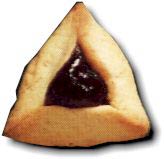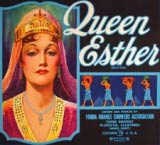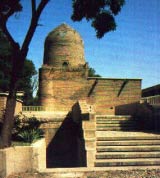 ...YES IT IS TRUE... Xerxes= Ahusuerus....
...YES IT IS TRUE... Xerxes= Ahusuerus....
(the king in “300“) gets rid of his queen, Vashti, (legend has it, he beheads her) because she refuses to go to his party and put herself on display for his male partiers. The king’s advisors tell him that if he doesn’t get rid of her, then all the other wives in the kingdom will disobey their husbands because the queen disobeyed hers. And who wants a feminist nation full of shrews? These men were ahead of their time on that one. To replace his deposed queen, Xerxes holds a beauty contest for his next queen from all the nations in his kingdom. Not exactly Betty Friedan/Gloria Steinem stuff. And, again, that’s part of why I like this politically incorrect story of Jewish survival.



read the rest at debbieschlussel.com



"No. Remember the Bismarck Archipelago. No overt
homosexuality. A functioning police state needs no po-
lice. Homosexuality does not occur to anyone as con-
ceivable behaviour.... Homosexuality is a political
crime in a matriarchy. No society tolerates overt re-
jection of its basic tenets. We aren't a matriarchy here,
Insh'allah. You know the experiment with rats where
they are subject to this electric shock and dropped in
cold water if they so much as move at a female. So they
all become fruit rats and that's the way it is with the
etiology. And shall such a rat squeak out, 'I'm queah
and I luuuuuuuuve it' or 'Who cut yours off, you two-
holed freak?' 'twere a square rat so to squeak. During
my rather brief experience as a psychoanalyst -- spot of
bother with the Society -- one patient ran amok in Grand
Central with a flame thrower, two committed suicide
and one died on the couch like a jungle rat ( jungle rats
are subject to die if confronted suddenly with a hope-
less situation). So his relations beef and I tell them, 'It's
all in the day's work. Get this stiff outa here. It's a
bring down for my live patients' -- I noticed that all my
homosexual patients manifested strong unconscious
heterosex trends and all my hetero patients uncon-
scious homosexual trends. Makes the brain reel, don't
it?"
Naked Lunch a novel by William S. Burroughs originally published in 1959 via lib.ru
Esther (Hebrew: אֶסְתֵּר, Modern Ester Tiberian ʼEstēr), born Hadassah, is the eponymous heroine of the Biblical Book of Esther. According to the Bible she was a Jewish queen of the Persian king Ahasuerus (traditionally identified with Xerxes I). Her story is the basis for the celebration of Purim in Jewish tradition.
image via en.wikipedia.org
According to the Esther 2:7, Esther was originally named Hadassah. Hadassah means "myrtle" in Hebrew. It has been conjectured that the name Esther is derived from a reconstructed Median word astra meaning myrtle.[4]
An alternative view is that Esther is derived from the theonym Ishtar. The Book of Daniel provides accounts of Jews in exile being assigned names relating to Babylonian gods and "Mordecai" is understood to mean servant of Marduk, a Babylonian god. "Esther" may have been a different Hebrew interpretation from the Proto-Semitic root “*?aθtar- ‘morning/evening star’”,[5] which descended with the /th/ into the Ugaritic Athtiratu[6] and Arabian Athtar.[7] The derivation must then have been secondary for the initial ayin to be confused with an aleph (both represented by vowels in Akkadian), and the second consonant descended as a /s/ (like in the Aramaic asthr "bright star"), rather than a /sh/ as in Hebrew and most commonly in Akkadian.
Wilson, who identified Ahasuerus with Xerxes I and Vashti with Amestris, suggested that both "Amestris" and "Esther" derived from Akkadian Ammi-Ishtar or Ummi-Ishtar.[8] Hoschander alternatively suggested Ishtar-udda-sha ("Ishtar is her light") as the origin with the possibility of -udda-sha being connected with the similarly sounding Hebrew name Hadassah. These names however remain unattested in sources, and come from the original Babylonian Empire from 2000 BCE,[citation needed] not the Chaldean Empire or Persian Empire of the Book of Esther.[citation needed]
The Targum[9] connects the name with the Persian word for "star", ستاره setareh, explaining that Esther was so named for being as beautiful as the Morning Star. In the Talmud (Tractate Yoma 29a), Esther is compared to the "morning star", and is considered the subject of Psalm 22 because its introduction is a "song for the morning star."

